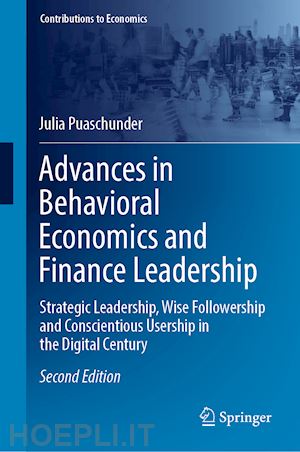
Questo prodotto usufruisce delle SPEDIZIONI GRATIS
selezionando l'opzione Corriere Veloce in fase di ordine.
Pagabile anche con Carta della cultura giovani e del merito, 18App Bonus Cultura e Carta del Docente
This book explores human decision-making heuristics. The monograph studies how nudging and winking can help citizens to make rational choices and governments to create choice architectures that aid in stabilizing markets and flourishing society. By applying the behavioral economics approach to political outcomes, it demonstrates how economics can be employed for personal benefits but also foster the greater societal good.
A review of the current literature on human decision-making advantages and failures in Europe and North America opens the book. A wide range of nudges and winks is presented that aid to curb the harmful consequences of human decision-making fallibility. Awareness of mental heuristics and biases in the finance domain is strengthened in order to understand how to nudge people to benefit from economic markets but also help governments to stabilize economies in providing strategic market communication. The author also proposes concrete leadership and followership directives on nudging in the digital age. This book appeals to scholars and policy makers interested in rational decision-making. The behavioral perspective features the strategic use of nudging and winking in the digital age.
The second revised and expanded edition offers the newest insights on behavioral e-Economics and the latest developments regarding the COVID-19 pandemic. It covers topics such as the role of social media in finance and discrimination in searchplace competition. It also offers new insights on strategic leadership and smart followership directives to successfully navigate through complex and fast-paced e-architectures.
Julia Margarete Puaschunder is a behavioral economist working at the Inter-University Consortium of New York at Columbia University. Prior to that she was a faculty associate at Harvard University. As a Friends of the International Institute for Applied Systems Analysis (IIASA) board member, she advances science diplomacy in cooperation with the United States National Academy of Sciences.











Il sito utilizza cookie ed altri strumenti di tracciamento che raccolgono informazioni dal dispositivo dell’utente. Oltre ai cookie tecnici ed analitici aggregati, strettamente necessari per il funzionamento di questo sito web, previo consenso dell’utente possono essere installati cookie di profilazione e marketing e cookie dei social media. Cliccando su “Accetto tutti i cookie” saranno attivate tutte le categorie di cookie. Per accettare solo deterninate categorie di cookie, cliccare invece su “Impostazioni cookie”. Chiudendo il banner o continuando a navigare saranno installati solo cookie tecnici. Per maggiori dettagli, consultare la Cookie Policy.